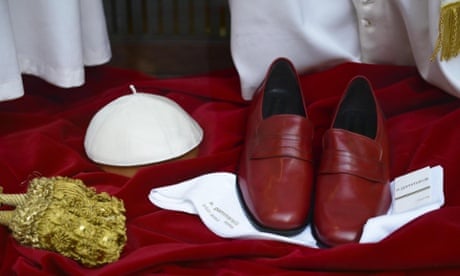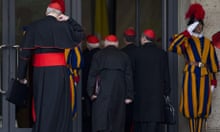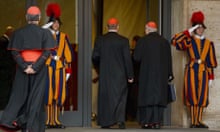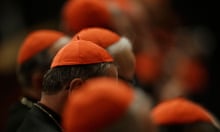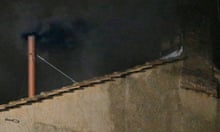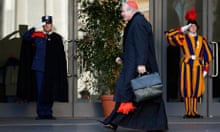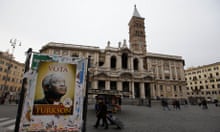1. The issue at a glance
2. A brief history
3. What happens next?
4. The options – and key arguments
5. What does it mean for me?
6. Key players
7. Glossary
8. FAQ
9. Some key figures
10. In greater depth
1. The issue at a glance
The cardinals of the Catholic church are gathering in Rome this month to select a successor to Benedict XVI as leader of the world's 1.2bn Catholics.
2. A brief history
Last month Pope Benedict stunned the world when he became the first pope to resign voluntarily from the job after he had freely accepted it eight years ago. Before him, Pope Celestine IV had resigned in 1294 after five months – but he had never wanted the job and had to be forced into accepting it.
In 1415, Pope Gregory XII resigned to end a schism, at the same time as the anti-pope, John XXIII, so that a new candidate could be elected to replace them both. But all the other 261 popes died in office, so far as we know, and it was widely believed that no pope could resign.
3. What happens next?
The cardinals assemble in Rome and formally discuss when to hold the conclave: the gathering of cardinals aged under 80 who will elect the next pope from among their number. Informally, this week is spent sounding out opinion and deciding what are the most urgent tasks facing the candidates. This is one of the most important parts of the process and although it is surrounded by rumour, it is nearly as secretive as the election itself.
The election place in the Sistine chapel, beneath Michelangelo's glorious frescoes. It is in fact one of the most democratic forms of election known, however authoritarian and undemocratic the organisation is otherwise.
The 115 cardinals who will vote this time are locked in (the word conclave comes from the Latin cum clave, meaning "with a key") until they reach a decision. They are allowed to sleep in special apartments, and to shower but these are modern innovations.
The cardinals ballot repeatedly and secretly – each cardinal writes the name of his favoured candidate on a slip of paper, preferably in a disguised hand, and folds it so it is invisible before the votes are reckoned. The winning candidate must get two-thirds of the votes – 77 cardinals this time around – and the process continues until this majority is attained. After each round of voting, the ballots are burned, and additives are put in with the smoke to ensure it comes up black (no agreement has been reached) or white (we have a pope!).
The winner is asked if he will accept the post. If he does he is taken to a side room where three different sizes of vestments have already been prepared, for small, medium and large pontiffs. He is then taken out on to the balcony of St Peter's Basilica and presented to the waiting crowds under a name he has chosen.
4. The options – and key arguments
Although all of the cardinal electors have been chosen under the last two popes, and are therefore regarded as conservatives, there is real doubt as to whether the conservative line of the last two papacies can continue. Key decisions must be made about clerical celibacy, about the reform and cleanup of the Vatican culture, about how to reach the cultures of the developed world from which the church seems increasingly estranged, and about how to manage relations with other religions, especially Islam. The first three of these are generally agreed to be the most urgent but whether there is any wish for real change is not at all clear.
The obvious question is whether the pope should once more be a European, after a Pole and a German interrupted a sequence of Italians that had lasted 455 years. There are Italian candidates this time around, too, but much of the excitement comes from the idea of a pope from the developing world.
Should he be an African? The two lead candidates from that continent, Cardinal Turkson of Ghana and Cardinal Sarah of Guinea, lack experience. Turkson is further handicapped by the appearance of having campaigned for the post. But there is a lot of excitement about him among the bookmakers.
Should the next pope be a native Spanish speaker? There are some impressive candidates from Latin America and the Philippines and the church is growing in both these parts of the world, as it is in Africa. The names to watch here are Cardinal Sandri of Argentina, Cardinal Maradiaga of Honduras and Cardinal Scherer of Brazil (Portuguese is close enough, in this context).
5. What does it mean for me?
If you're a cardinal: This is almost certainly your last chance at the really big job. It is generally agreed that the new pope must be a man of remarkable energy and is for that reason likely to be relatively young – under 70 at least. That would give him five to 10 years in office at full strength, and by that time almost all the present electors will be over 70 themselves.
If you're a priest: The man who is chosen will have huge power over your life, should he choose to exercise it. His policies will determine who your bishop is, what your chances are of promotion, and whether you may marry or be open about your sexuality. He will determine just what you can hope to say in public and keep your job or be promoted.
If you're a lay Catholic: Surprisingly little will change. The pope may inspire or disappoint you, but he will have very little power over your life unless you live in the Vatican city. But you will still see him as one of the most significant of all world leaders.
If you're not a Catholic: There are 80 countries around the world with Catholic populations of more than a million, so the pope will have some influence almost everywhere in the world. Certainly, in an age of global celebrity, there is no one who can draw crowds as a pope does. That is not to say that his teachings are widely followed
6. Key players
The organiser
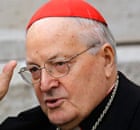
Cardinal Angelo Sodano: The voice of the old guard, and also the man who, as dean of the college of cardinals, is in charge of arrangements for the conclave. Now 85, he served as a Vatican diplomat for many years, and then as secretary of state (essentially the pope's chief of staff) under John Paul II and Benedict XVI until his retirement at 80. He was implicated as one of the protectors of the disgraced founder of a religious order, Fr Marciel Maciel, whose voracious sexual appetites went unnoticed in the Vatican during all the years his order, the Legionnaries of Christ, were major fundraisers; and accused by Cardinal Schönborn of Vienna of protecting the disgraced Austrian archbishop Hans Hermann Groër.
The papabile
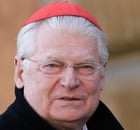
Cardinal Angelo Scola: The son of a truck driver, Scola holds doctorates in philosophy and theology and was professor of theological anthropology at the John Paul II Institute for Studies on Marriage and Family. He was appointed bishop of Grosseto in 1991, patriarch of Venice in 2002, created a cardinal in 2003, and appointed archbishop of Milan in 2011. In spite of his place at the top of the Vatican hierarchy and his academic pedigree, he has urged the church to do more to appeal to the modern world, arguing it needs to build on the second Vatican Council of the 1960s, which proved a landmark moment in Roman Catholic history. An ardent believer in the church's role at the centre of society, Scola has publicly bemoaned its inability to clearly communicate its message on matters such as marriage. He is strongly tipped to replace Benedict.
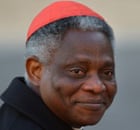
Cardinal Peter Turkson: The archbishop emeritus of Cape Coast is seen by many as a strong contender to be the next pope. However, some feel he has been a little too keen to signal his willingness to serve. A few days after Benedict announced his resignation, Turkson said: "I think in a way the church is always and has forever been ready for a non-European pope". Asked about speculation that he could himself emerge from the conclave as Benedict's successor, he said: "I've always answered, 'If it's the will of God.'"
He has alienated himself from more liberal Catholics by suggesting that the African church has been spared the sexual abuse scandals that have afflicted its European and US counterparts because of the strong African cultural taboos against homosexuality. Turkson was at the centre of controversy in October 2012 for showing an alarmist film at a synod, which claimed that France would be an Islamic republic in 39 years. He was created a cardinal by John Paul II on 21 October 2003.
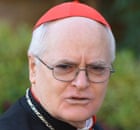
Cardinal Odilo Scherer: Appointed archbishop of São Paulo in March 2007, Scherer was created a cardinal by Benedict just eight months later. Although he is tipped as a possible papal candidate, his low profile among other cardinals may be problematic. Leading the archdiocese of São Paulo (one of the largest with 6 million members) means Scherer has had to demonstrate his strengths and skills. He claimed in February 2013 that "it's time to have someone from a different culture, someone with new ideas". The cardinal is outspoken on abortion: when Brazil's supreme court voted in 2012 to legalise the termination of foetuses with malformed brains, Scherer asked which group "incompatible with life" would be eliminated next.
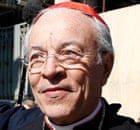
Cardinal Óscar Andrés Rodríguez Maradiaga
The multilingual cardinal holds a doctorate in theology and a diploma in clinical psychology and psychotherapy. He has taught chemistry, physics and music and was professor of moral theology and ecclesiology at the Salesian Theological Institute. He became archbishop of Tegucigalpa in January 1993. Regarded as a moderate, Rodríguez Maradiaga is viewed as a rising star of the church. An ardent defender of human rights and a powerful voice in the global fight against poverty, he was the Vatican's spokesman with the International Monetary Fund and the World Bank on the issue of third world debt. He was created a cardinal by John Paul II in the consistory of 21 February 2001.
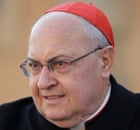
Cardinal Leonardo Sandri: Like many Argentinians, the grand chancellor of the Pontifical Oriental Institute is of Italian descent (his parents emigrated to South America from Trentino) – a fact that is unlikely to harm his chances of succeeding Benedict. Sandri, who speaks five languages and has represented the Vatican in the US, Venezuela and Mexico, served as the voice of John Paul II when Parkinson's disease left the pontiff unable to do so. He also announced John Paul's death in 2005. But despite being head of the congregation of Oriental churches – which makes him responsible for Catholics in Bethlehem and elsewhere in the Holy Land – some have noted that Sandri's star has been waning and his current role is less influential than the positions he occupied under John Paul. He was created a cardinal by Benedict XVI on 24 November 2007.
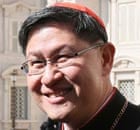
Cardinal Luis Antonio Tagle: Appointed as archbishop of Manila in 2011, Tagle has been hailed by some as a worthy successor. The cardinal's youth – he is the second youngest of the cardinals after Baselios Cleemis Thottunkal – coupled with his detailed knowledge of Vatican history, his charisma and his progressive outlook, make him a strong candidate. If successful, he would be the first Asian pope. Tagle, however, has been outspoken at times. In Rome in October 2012, he told a gathering of bishops that the church should be more ready to admit its mistakes and has been connected to the "Bologna xchool" of progressive academics who have taken a liberal view of the second Vatican Council. He was created a cardinal by Benedict XVI on 24 November 2012.

Cardinal Christoph Schönborn: The archbishop of Vienna is considered one of the forerunners for the papacy. In addition to being a polyglot (as well as German he speaks French, Italian, English, Spanish and Latin fluently) his education in theology, philosophy and psychology may stand him in good stead for success. His public stance has been more moderate on issues such as HIV/Aids than some of the other candidates. The cardinal has also gained respect for his handling of the sex abuse scandal, stating: "The days of cover-up are over. For a long while the church's principle of forgiveness was falsely interpreted and was in favour of those responsible and not the victims". He was created a cardinal by John Paul II on 21 February 1998.

Cardinal Marc Ouellet: Ouellet was named titular bishop of Agropoli and secretary of the Pontifical Council for Promoting Christian Unity in March 2001 and was ordained a bishop by John Paul II in the same month. A year later he was appointed metropolitan archbishop of Quebec and in 2010 he was nominated prefect of the Congregation for Bishops and president of the Pontifical Commission for Latin America. Tipped as a strong candidate for pope, the cardinal caused controversy when, in 2010, he told an anti-abortion conference that terminating a pregnancy was a "moral crime" even in rape cases. He has also testified before the Canadian senate, urging legislators to vote against legalising gay unions, which he described as "pseudo-marriage, a fiction". He was created a cardinal by John Paul II on 21 October 2003.

Cardinal Robert Sarah: Sarah was nicknamed the baby bishop by John Paul II, who made him archbishop of Conakry at the tender age of 34 in 1979. The cardinal, who studied in Guinea, Ivory Coast and Rome, is the president of the Pontifical Council Cor Unum, which oversees the church's humanitarian aid. In 2010, he dismissed Muammar Gaddafi's call for Europe to convert to Islam, describing it as an "unsolicited provocation lacking seriousness", but adding that the true danger for Europeans was "relativism, the lack of attention to faith, the weakness of religion, indifference to the sacred". Sarah, who is a secretary of the congregation for the Evangelisation of Peoples, was created a cardinal by Benedict XVI on 20 November 2010.
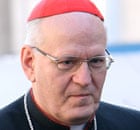
Cardinal Péter Erdő: Just 51 when he was created a cardinal by John Paul II in 2003, the conservative Erdő has served as rector of Rome's Hungarian Pontifical Institute and taught at the Pontifical Catholic University Argentina (Buenos Aires) and at the Pontifical Lateran University. He is the author of several works and is the president of the Council of European Bishops' Conferences.
Scandalous

Cardinal Roger Mahony: The archbishop emeritus of Los Angeles was urged to stay away from the conclave after his successor stripped him of all his public and administrative duties because of his role in protecting priests accused of sexual abuse. Archbishop José Gómez announced the move on 31 January as America's largest Catholic archdiocese released thousands of files on priests accused of molesting children. The documents showed that Mahony and his former top aide, Thomas Curry, both worked to send priests accused of abuse out of the state to shield them from scrutiny. He has ignored demands not to attend the conclave, tweeting last week: "Just a few short hours before my departure for Rome. Will be tweeting often from Rome, except during the actual conclave itself. Prayers!" He was created a cardinal by John Paul II on 28 June 1991.
7. Glossary
Papabile: Literally "pope-able", this is the Italian word used to describe serious candidates for the job, who might last through the first five ballots at least.
Conclave: The gathering of cardinals which will actually elect the pope. A total of 115 will vote this time.
Secretary of state: No 2, or chief of staff, at the Vatican: an immensely powerful and important position, held by Tarcisio Bertone, though technically empty while there is no pope.
Curia: The Vatican bureaucracy which actually runs the church.
8. FAQ
Could they choose a woman?
No, but it is a little known fact that a woman could be appointed a cardinal. Although Pope John Paul II did his best to define as almost infallible his opinion that a woman could never become a priest, there is no requirement for a cardinal to be a bishop, a priest or even a deacon, although they have in practice always been. So a thoroughly reformist pope could always make a few nuns cardinals in time to help choose his successor.
Could he end the celibate priesthood?
In a word, yes. But it would require widespread consultation, and the results would be messy. The reform most often proposed is to allow the ordination of already married men, but not to allow priests already ordained to marry. This has caused tensions in England and Wales, where married Anglicans have been taken into the Catholic priesthood.
Is the pope really infallible?
Hardly ever: popes have made infallible pronouncements twice since the doctrine was defined in 1870, and both times on questions that have no earthly answer, concerning the eternal nature of the Virgin Mary. On all other questions, popes may turn out to be wrong, after several centuries of consideration, which is probably just as well.
Who is going to win, then?
No one knows, the bookies probably least of all. Even the opinion of the Guardian is not infallible in this context, but it would be surprising if the name were not one of those on our list.
9. Some key figures
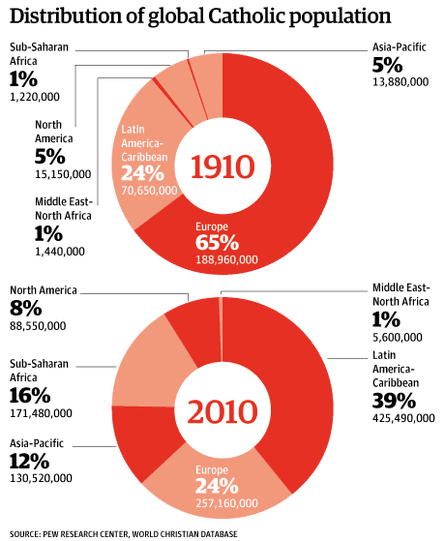
Click on the map below to see it in detail
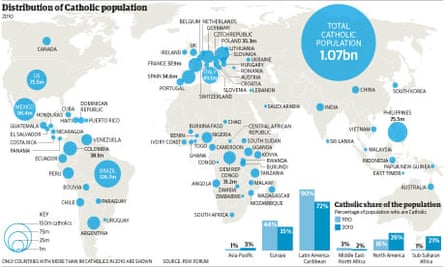
10. In greater depth
John Allen in the National Catholic Reporter: a wise and experienced Vatican watcher considers the legacy of Pope Benedict XVI.
The Tablet: the leading British Catholic journal looks at the choices facing the conclave.
Colm Tóibín in the London Review of Books: Irish author gives a sympathetic yet unsparing account of the church's difficulties with gay people.
British Religion in Numbers on British Catholicism: the indispensable site for anyone interested in the facts about religion in Britain has a hoard of Catholic statistics and reflections on their significance.
Pew Forum's global Christianity interactive: flash in both senses of the word.
